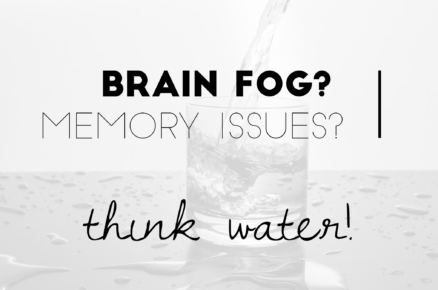It’s 3pm and you’re sitting at your desk. You have a dry mouth, you can’t concentrate or keep your eyes open. You’re not hungry because you had a well-balanced lunch a few hours ago. Then you look at your water bottle on the corner of your desk and realize you haven’t touched it all day. It’s a fairly well known fact that you need to drink water throughout the day, but I wanted to know what the exact implications of not frequently picking up that water bottle are.. so of course I went to the research.
I want YOU to function at your highest potential and sufficient water intake is one simple piece to get you there.
What is it about water?
Water is a big part of who we are – literally. Our bodies are made up of about 50-60% of water and our bodies are always working to make sure we have the right balance of it.1
There isn’t one specific marker to easily assess the hydration status of the body. And because of this we have a recommendation for water intake that varies from person to person and is hotly debated.2 You’ve probably been told to drink 8 glasses of water a day, but does that really apply to you?
A number of variables go into a water recommendation such as exercise, the foods you’re eating, your height and weight or how frequently you’re urinating. Using myself as an example, I drink at least 2L of water per day on a slow day but upwards of 4L when I am at the gym and talking all day long. For me there is no risk of lowering my electrolytes because my body is used to it and craves this water. If I don’t drink enough then I definitely feel it. And for me cognition is one of the main ways I feel my dehydration.
Does hydration affect your brain?
Cognition is the progression of how we get information from the environment, process and understand it. When we think about the actual definition, we need our cognition to be functioning (very meta). And this process needs to be happening nearly every waking minute in order to make it through the day.
What does the research show us about water and your brain?
In one particular study they looked at memory and focused attention, two things we do every day whether we realize it or not. In both the short and the long term thirst and dehydration affected the ability to focus, think and remember.2 Yes! That means if you are struggling with midafternoon brain fog you may not need to fix your thyroid, your hormones or your inflammation. Instead, you may need to fix your water intake!
How much water should I be drinking?
Even the feeling of being thirsty, either consciously or unconsciously, affects memory and focus. To me, that is enough motivation to drink more water throughout the day. Something as simple and accessible (to most) as clean drinking water should be one of the first habits to focus on.
With apps such as Waterbalance and Hydro Coach to remind you to take a sip out of that water bottle on the corner of your desk, you can set yourself up for success with memory and focus. Always remember that your water intake will probably differ from the person next to you in the office.
My recommendations are to add an extra one cup of water per day until you hit 8-10 cups of water. Then sit here for a few days. Are you still getting thirsty? Craving more water? Then go up to 11-12 cups per day. Generally, unless you are very active you will not need more than this.
What are your tricks to increase your water consumption?
Let me know on social!
References
- Benton, D. (2011). Dehydration influences mood and cognition: a plausible hypothesis? Nutrients, 3(5), 555–73. https://doi.org/10.3390/nu3050555
- Benton, D., Jenkins, K. T., Watkins, H. T., & Young, H. A. (2016). Minor degree of hypohydration adversely influences cognition: a mediator analysis. American Journal of Clinical Nutrition, 104(3), 603–612. https://doi.org/10.3945/ajcn.116.132605

